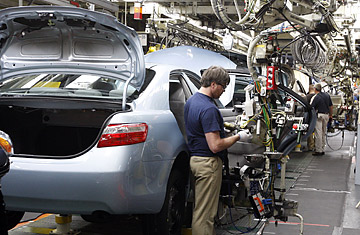
A worker installs a door on a Toyota Camry on the assembly line at the Toyota Motor Manufacturing Kentucky plant in Georgetown, Kentucky
(2 of 2)
Still, most southerners champion their region's low-tax, non-union style of economic development, which they credit for luring overseas car companies like BMW and Kia to build major plants from Kentucky to South Carolina to Texas. More important, after spending the 20th century as America's industrial backwater — and after watching the conservative Reagan revolution they once led fade away in last month's presidential election — they hail the idea that the South is rising again in the 21st century. "The sense of confidence is palpable," says Jim Cashman, a management professor at the University of Alabama and a Chicago native who has worked in the auto industry. "Companies like Mercedes have legitimized the efforts of the New South."
Alabama has been particularly aggressive. Since the early 1990s, the state has offered German-based Mercedes, Japan's Honda and South Korea's Hyundai a staggering $1 billion in tax incentives, abatements and infrastructure improvements to build plants there. The return on investment has been $7 billion, creating almost 50,000 direct jobs and another 70,000 in sectors like parts suppliers. The population of the town of Vance, where the 4,000-employee Mercedes factory is located, has leapt from 500 to 2,000. Unlike the local sawmill, fertilizer plant or rock quarry, residents feel Mercedes "is going to survive, no matter what," says one woman who has five family members working there. "That's what made Vance what it is."
But before Dixie gets too smug, it should acknowledge a debt it owes Detroit, or rather Detroit's labor union, the United Autoworkers (UAW). The UAW has made the Big Three's labor force one of the world's best paid and protected — clout that is now a focus of what's wrong with Detroit. Still, the foreign automakers are in America in large part because, as their more fuel-efficient cars became popular in the U.S. in the 1980s and '90s, the UAW lobbied to get them to build production plants here.
True, those Asian and European firms flocked to the South to avoid Detroit's high-cost culture. But while southern auto employees extol the union-free, right-to-work rules of their states, the truth is that they might still be earning the basement-level wages of a Mississippi textile worker today if the UAW hadn't leaned on the likes of Mercedes in Washington. "Mercedes wanted a much lower pay scale when it arrived here," says Cashman, who notes that veteran southern autoworkers now earn "only fractionally less" than the average $27 an hour for Detroit workers (and often end up with more, thanks to the foreign car companies' bonus systems). "If not for the UAW pressure, the starting pay would have been more in line with the going wage rate of this region instead of this industry."
At the same time, southern workers have taught the UAW an important lesson about helping to keep that industry viable. The foreign companies enjoy not only the South's lower legacy costs but a more flexible production culture. Unlike the Big Three, the southern car plants are far more agile when it comes to accommodating shifting market demand; and that's due largely to employees' willingness to exact fewer of the production rules UAW contracts are notorious for.
Part of that efficiency is what Edward Miller, a Honda spokesman in Alabama, calls a modern "harmonious flow" — having nearby vendors supply parts, and workers assemble them, as they're needed rather than stockpiling too much inventory or flooding the market with, say, gas-guzzlers no one wants to buy anymore. "Southern communities understand you can't tie organizations down with restrictions," says manufacturing management expert David Miller of the Alabama Productivity Center. "Successful auto companies in the South provide all the positives you'd find in a union shop."
Perhaps. But labor advocates still fear for U.S. workers if the South's automotive industry supplants Detroit as the template. And it's not as if all is as shiny as a new Lexus in Dixie right now. The Mercedes plant in Vance recently had to cut back to a four-day workweek; and with even Japanese powerhouse Toyota facing U.S. sales slumps, the company this week said it's delaying the startup of a new plant in Mississippi that will make its Prius hybrid car. Even workers like Ray now feel that a union "would definitely benefit" Dixie autoworkers; and either way, says Cashman, the New South's economies "still have many, many miles of training and education to go."
Still, you don't hear any of the Big Three these days even thinking of opening a $1.2 billion, 2,000-employee facility in Georgia, as South Korea's Kia is set to do next year. It's enough to make a NASCAR driver take a victory lap.
